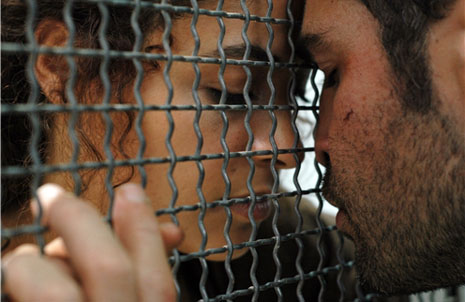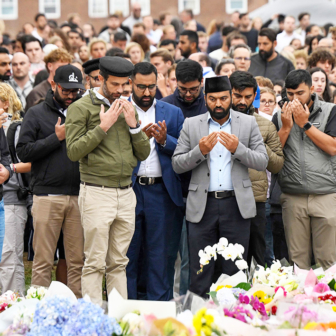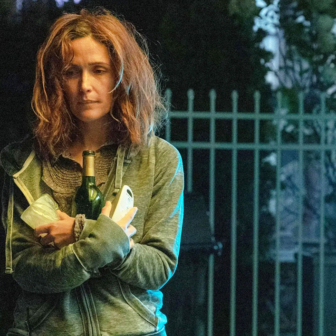THE NOW-ANNUAL Palestinian Film Festival ran last weekend in Sydney, and moves on to Melbourne and Adelaide. For most sessions in Sydney, the cinema in Leichhardt was packed; attendances were greatly increased since last year – evidence, perhaps, of significantly shifting consciousness.
The last item in the program was, you’d have to say, cinematically sparse; but the queue went down the stairs and out into the street. Edward Said: The Last Interview is just two hours of one man talking; with punctuating fades and cutaways to the interviewer, movements in and out on face and figure, but virtually no changes of camera position on the subject. The critic and activist was interviewed only months before his death from leukemia in September 2003; he was pale and gaunt, but absolutely lucid, plain-spoken and passionate. The audience was held fast while he canvassed some of the issues in his own story, a Palestinian Arab born in Egypt in 1935, to well-placed Christian parents; exiled in America, from age fifteen, for the sake of his education; eventually a critic and teacher of classical European literature, a member of the American and international academic establishment; musician, music critic, fighter and spokesman for the Palestinian cause.
What emerged, dynamically, was the way the tensions among those identities have to do with the constant to and fro of his thinking, both as it is elaborated in prose and as it came over in the film. As he responds to his interviewer, Charles Glass, Said’s opposition to the Occupation and his support for the right of the Palestinians to living space in their lands are fundamental; they are given; but at the same time he won’t condemn Zionism outright, knowing too much about the complexities of its history. Nor will he defend nationalism of any kind, nor support the much-canvassed two-state solution: in the face of the Occupation and all its cruelty, he still wants to see Palestinians and Israelis sharing their country, learning to live together. (He’s not the only Middle Eastern intellectual to argue this way; vide Ilan Pappe’s History of Israel–Palestine.) At the same time, in fighting the Occupation and the expansion of settlements on the West Bank, Said gives no houseroom to the compromised Oslo accords, and leaves the late Chairman Arafat without a feather to fly with.
Along the way, he revisits the strange position of literature and literary criticism in anti-imperial and postcolonial struggles, and looks back at his own essays on Joseph Conrad – who, like him, had to negotiate several identities – and especially on Heart of Darkness. He also finds words for an area where, for many of us, language fails: his experience of music. In all this something very curious is happening; intellectual processes become a set of cinematic events for a cinema audience. (As they do, but differently, in the work of Jean-Luc Godard, who has said that “anything whatever can be filmed” – including philosophic and political abstractions.)
And this wasn’t a captive audience; according to the festival’s organisers, only a minority of those who answer their surveys identify as Palestinian; many are of local Lebanese families, Muslim, Christian and secular; and a good many more are ourselves, ordinary Anglo-Australian moviegoers. For all of them and us, the festival presents a map of Palestine – and Israel–Palestine – which you won’t be getting from the mainstream media. In one film after another, documentary and fiction, the checkpoints are there, the banked up traffic, the irrational bureaucratic obstructions. In Pomegranates and Myrrh, a pretty romantic drama, the bridegroom is badly held up on the way to the wedding; in a stark half-hour animation, Fatenah – based, they said, on a true story – a young woman in urgent need of breast cancer treatment is fatally delayed.
On audience demand, the festival screened again a marvellous documentary from last year, Slingshot Hip Hop, in which teenage music groups bop and rap their way from innocence into politics as they find out how long it can take, for example, to get a group from one end of Gaza to the other (eight checkpoints). Invited to share a major concert with other groups in the West Bank, the Gaza group can’t make it; with great difficulty, negotiating the Wall, the boys who live inside Israel manage to get there. Parents are seen supporting the kids; however alien they find the pounding music, they still understand that this cultural pursuit (“another kind of resistance”) is better than throwing rocks. A girl singer is shown in double resistance – against her family’s notions of her feminine role, and then, with the boys, against the Israeli authorities. Their project carries them beyond their first intentions; they and it are transformed. This little movie should get around; it’s an ultimate anti-depressant.
One feature film, Elia Suleiman’s The Time that Remains, is a fine autobiographical meditation on the eminent director Suleiman’s own life, his parents’ and Palestinian history since 1948. Seen at the beginning of the program, it connects in retrospect with Said’s thinking at the end, when he says that while the Occupation continues there can be no conciliation, no meaningful peace process. It’s not only the violence (in both directions), the irrational degrees of surveillance, but also the indignities constantly inflicted. The film that most completely unfolds the situation (and one that had a good few people reaching for the Kleenex) is the great documentary essay, The Heart of Jenin. When that town comes under fire Ahmed, a six-year-old boy, is killed. After only a little hesitation his parents agree that his organs, the symbolic heart included, should be given to Israeli children whose lives may thereby be saved. A year and a half later Ahmed’s father, Ismail, goes travelling through Israel to visit the young beneficiaries. This involves struggling at checkpoints to explain his errand to completely unsympathetic functionaries, and in one case facing hardline Zionist parents who are most reluctant to credit his humanity. See it if you can – and send the DVD to politicians who need straightening out on Israel–Palestine; I think those may include the prime minister. •





